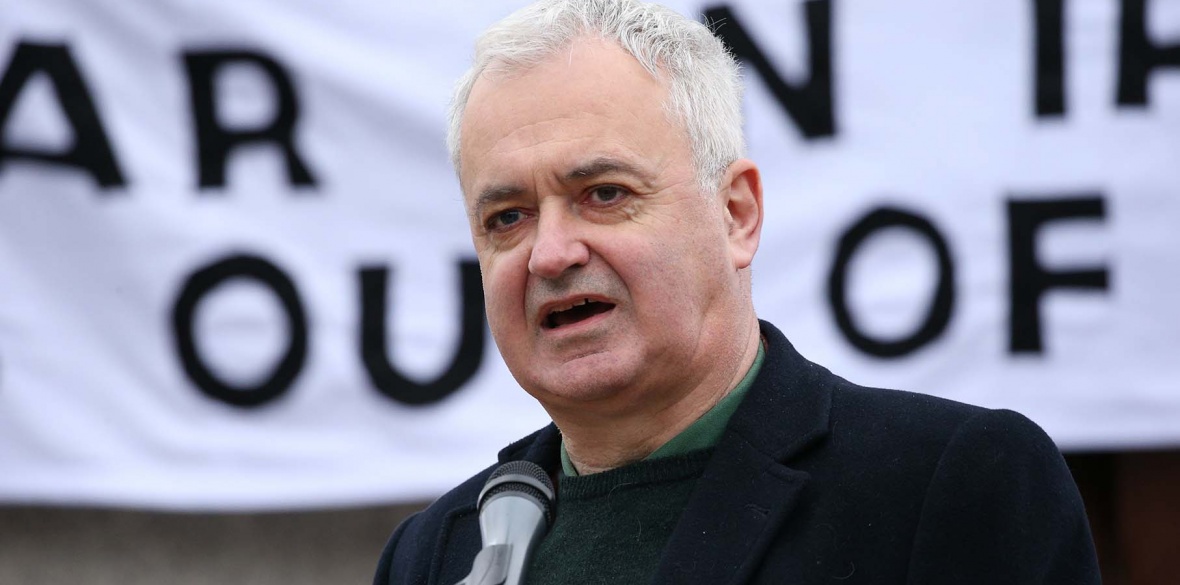This is the last article you can read this month
You can read more article this month
You can read more articles this month
Sorry your limit is up for this month
Reset on:
Please help support the Morning Star by subscribing here
IS SOCIALISM possible in Britain? Andrew Murray’s book of the title seeks to explain the five-year socialist project, and its failure, in a class context.
Corbynism may be “receding into the rear-view mirror” of politics — though the standing ovation Jeremy Corbyn received at The World Transformed on Saturday shows how popular it remains in some quarters.
But Murray’s concern is to assess which factors made the Corbyn project strong and which ultimately brought it down. And that comes down to class: “That’s the $64,000 dollar question if you like,” he says. “Can class politics be recalibrated?
“It’s not a unique British problem. Elsewhere too, the main organisations of the left went down the road of embracing capitalist globalisation and neoliberalism, helping to shatter their traditional base in society and their social roots.”
It’s what hit Labour in 2019 — but it was a long time coming. The once impregnable majorities of the “red wall” had been dropping for decades, with each election since 1997 seeing the Labour vote reduced by thousands in dozens of constituencies in the Midlands, northern England and Scotland. The first “red wall” to fall was in Scotland in 2015, before Corbyn became leader.
“People’s voting habits don’t change overnight. The mine doesn’t shut on Friday and the miner vote Tory on Monday. But 30 years down the line the bill comes due.”
The anomalous election was not Labour’s loss of so many seats in 2019, but it managing to reverse the trend in 2017 and increase the Labour vote in these “heartlands.”
Murray believes Corbynism’s strong performance in 2017 was based on building a successful coalition of interest that united post-industrial working-class communities with large numbers of predominantly young people who might be described as “middle class” — but who face many similar problems: the inability to get a stable job, difficulty affording housing, downward pressure on pay and concern about a changing climate.
“Corbynism recognised this common interest intuitively rather than theoretically, but it showed that such an alliance could be built.”
Can you recreate that coalition though once the wall has fallen? The experience of Scotland is not encouraging. Politics has polarised on a nationalism v unionism axis and in 2017 Labour’s advance was notably weaker there than elsewhere. Seven years after 2015 Labour shows no sign of recovery.
“The coalition can be recreated if you have a programme pitched the right way. People don’t want to be dragged into the weeds of identity politics. You want a clear and simple programme that addresses class needs.
Corbyn’s successful coalition was unstable though, and unravelled because of Brexit. A key weakness was that the membership surge was where the Labour voters weren’t: in 2018-19 Labour had as many members in south-east England, where it held just eight or nine seats (outside London), as in north-west England where it had around 50 seats.
Because Corbyn made much of the democratisation of the party the pro-Remain views of most members counted. But Murray doesn’t think that this problem was insurmountable.
“Attitudes to a second referendum depended on what question you asked the members. If you asked, do you want to stop Brexit — they would say yes.
“But if you asked what’s more important, stopping Brexit or getting Jeremy into Downing Street they would overwhelmingly have said the latter. There was a collective failure of leadership in failing to put these questions before the membership in the right way.”
That failure of leadership was shown in the lack of message discipline and self-discipline among the leading figures in the Corbyn project, a leadership thrown together around a campaign to be Labour leader its own authors hadn’t anticipated would succeed.
“There was no message discipline even among supporters, let alone the members of the team who were actually out to get him.” This scuppered the various attempts to strike and maintain compromise positions on Brexit policy.
Murray believes the Corbyn leadership’s only chance to have asserted respect for the referendum result was in the latter half of 2017, when the unexpectedly good result meant his authority in the party was enormous and even most of the parliamentary party had paused attacks.
Had a line been decided and propagated among the members then, it could have prevented the well-funded People’s Vote campaign — entirely run by Corbyn’s enemies — from winning such sway over them. By 2019, it was too late.
Corbyn’s coalition fell apart. Though the 2019 Labour vote was still greater than in 2015, 2010 and even 2005, when it won, though Labour retained a significant lead over the Tories among young people, and its dominance of London and most other large cities in England remained intact, the loss of the “traditional” working class thanks to Brexit betrayal had the predicted (by Murray, among others, as well as by the Morning Star as early as the autumn of 2018) devastating impact on the number of seats it could win.
Johnson’s win was celebrated on the right as the birth of a new coalition — one in which the post-industrial areas were won to the Tories by the promise of post-Brexit investment, “levelling up.”
Johnson doubled down on Theresa May’s rhetorical rejection of austerity. For a while, Britain seemed to be moving away from neoliberalism and towards recognition of the need for more state intervention in the economy, a trend in line with the course of other “first-wave” capitalist states like the US or Germany.
But now under Liz Truss Britain seems to be returning ideologically to the Thatcher stable. Why is neoliberalism so hard to kill off here even when Britain’s allies are shifting policy?
“The answer is the City of London primarily, and the structure of British capitalism, which is oriented towards global profit-making.
“The City is roughly the same size as a financial centre as Wall Street, but coupled to a far smaller domestic economy.” US GDP is roughly six times larger than Britain’s.
“So its proportionate weight is much greater. There is no comparable lobby in Germany — you have a manufacturing lobby concerned with exports, but not this locus fixated on the global unimpeded flow of capital, and that has embedded neoliberalism more deeply in Britain.”
Murray remembers a conversation with then shadow chancellor Ed Balls in which he stressed the need to challenge the dominance of the City to develop a more stable economy whose rewards are more evenly distributed. “Balls said what you’re proposing doesn’t reverse the last 40 years of economic policy — but the last 200 years.
“He was right. City of London interests predominated even in the 19th century, when British manufacturing was world-conquering, but then the City found it most profitable to invest in mills in Yorkshire or railways in Staffordshire. Those days are long gone.”
But if the Tories are returning to a discredited neoliberalism through loyalty to the City, when it has been increasingly clear most British people want a new approach — they themselves had to offer one in 2019 — can the Corbyn coalition be replicated and bettered by the “progressive alliance” with other parties, as suggested by some fearing the increasingly vicious repression and social reaction promoted by the Conservatives?
“It’s not a possibility because the basis would be some variation of the liberal centrism that has hegemonised politics from the 1970s until recently.
“That does not provide a basis for defeating the right wing. Millions of working-class people if given a choice between the centrism of Blair and Macron, and the right wing of Trump and Truss, will go for the latter.
“Any such alliance would need to be radical, along the lines set by Corbyn or Bernie Sanders, to compete because people want alternatives. A ‘progressive alliance’ of Keir Starmer and Ed Davey might be less malign than a Conservative government, but doesn’t offer a progressive political future.”
Murray, with most of the labour movement, sees the opposition led today not by Labour but by trade unions and campaigns they are developing to build a movement.
“Enough is Enough has shown the enormous desire there is for action, a recognition that Labour is not addressing that need. There’s huge enthusiasm, though one does worry that its base needs broadening institutionally.
“Corbyn’s ascent arose as a product of 20 years of mass struggle against war and austerity but once he became leader those struggles fell into abeyance, a lot of energy was focused simply on maintaining his leadership.
“The Communist Manifesto says the first task for socialists is the formation of the working class as a class for itself.
“When I entered politics 40 or 50 years ago, I thought that was a stage that was completed, we’d ticked that box. What we know now is that the formation of a class for itself is work that needs to be done over and over again, and you can see that consciousness being rebuilt in some of the disputes and campaigns today.
“The Corbyn experience shows that a radical left party leadership, even if supported by an aroused party membership, is not sufficient to effect social transformation unless buttressed by an aroused movement.
“If you’d had Jeremy as Labour leader and the strike wave we’re having now, that would have been an entirely different scenario to Jeremy without the strikes or the strikes but Starmer as Labour leader.”
And the answer to the title of the book? “Well, the answer is yes!”
Is Socialism Possible in Britain? by Andrew Murray is published by Verso, £14.99.
 Ben Chacko
Ben Chacko










